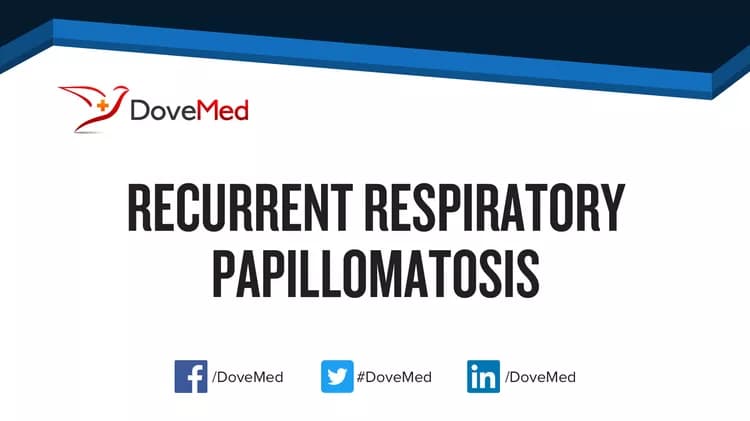What are the other Names for this Condition? (Also known as/Synonyms)
- Adult-Onset Recurrent Respiratory Papillomatosis (AORRP type)
- Juvenile Laryngeal Papilloma
- RRP (Recurrent Respiratory Papillomatosis)
What is Recurrent Respiratory Papillomatosis? (Definition/Background Information)
- Recurrent Respiratory Papillomatosis (RRP) is a rare viral disease where tumors (papillomas) grow in the air passages leading from the nose and mouth into the lungs (respiratory tract)
- Although the tumors can grow anywhere in the respiratory tract, their presence in the larynx (voice box) causes the most frequent problems, a condition called laryngeal papillomatosis
- The tumors may vary in size and grow very quickly. They often grow back even when removed
- RRP is caused by two types of human papillomavirus (HPV), called HPV 6 and HPV 11
(Source: Recurrent Respiratory Papillomatosis; Genetic and Rare Diseases Information Center (GARD) of National Center for Advancing Translational Sciences (NCATS), USA.)
Who gets Recurrent Respiratory Papillomatosis? (Age and Sex Distribution)
- Recurrent Respiratory Papillomatosis is a rare infectious condition. The condition can be seen in children and adults
- Both males and females may be affected
- Worldwide, individuals of all racial and ethnic groups may be affected
What are the Risk Factors for Recurrent Respiratory Papillomatosis? (Predisposing Factors)
- Exposure to the human papilloma virus (HPV 6 and HPV 11) can increase the risk for Recurrent Respiratory Papillomatosis
It is important to note that having a risk factor does not mean that one will get the condition. A risk factor increases one’s chances of getting a condition compared to an individual without the risk factors. Some risk factors are more important than others.
Also, not having a risk factor does not mean that an individual will not get the condition. It is always important to discuss the effect of risk factors with your healthcare provider.
What are the Causes of Recurrent Respiratory Papillomatosis? (Etiology)
Recurrent Respiratory Papillomatosis is caused by two types of human papillomavirus (HPV), called HPV 6 and HPV 11.
(Source: Recurrent Respiratory Papillomatosis; Genetic and Rare Diseases Information Center (GARD) of National Center for Advancing Translational Sciences (NCATS), USA.)
What are the Signs and Symptoms of Recurrent Respiratory Papillomatosis?
The signs and symptoms of Recurrent Respiratory Papillomatosis may include:
- Growth of small tumors in the nose and mouth, that also invade into the lungs (respiratory tract)
- The tumors are known to increase in size rapidly
- These tumors can cause breathing difficulties
- Tumors in the larynx (laryngeal papillomatosis) can lead to speaking difficulties
How is Recurrent Respiratory Papillomatosis Diagnosed?
Recurrent Respiratory Papillomatosis is diagnosed on the basis of the following information:
- Complete physical examination
- Thorough medical history evaluation
- Assessment of signs and symptoms
- Laboratory tests
- Imaging studies
- Biopsy studies, if necessary
Many clinical conditions may have similar signs and symptoms. Your healthcare provider may perform additional tests to rule out other clinical conditions to arrive at a definitive diagnosis.
What are the possible Complications of Recurrent Respiratory Papillomatosis?
The complications of Recurrent Respiratory Papillomatosis may include:
- Severe airway obstruction
- Surgical complications
- Recurrence of the tumors after surgery
Complications may occur with or without treatment, and in some cases, due to treatment also.
How is Recurrent Respiratory Papillomatosis Treated?
There is no cure for Recurrent Respiratory Papillomatosis. Surgery is the primary method for removing tumors from the larynx or airway.
- Because traditional surgery can result in problems due to scarring of the larynx tissue, many surgeons are now using laser surgery, which uses an intense laser light as the surgical tool
- Carbon dioxide lasers - which pass electricity through a tube containing carbon dioxide and other gases to generate light - are currently the most popular type used for this purpose
- In the past 10 years, surgeons have begun using a device called a microdebrider, which uses suction to hold the tumor while a small internal rotary blade removes the growth
- Once the tumors have been removed, they have a tendency to return. It is common for affected individuals to require repeat surgery. In the most extreme cases where tumor growth is aggressive, a tracheostomy may be performed
- Adjuvant therapies - therapies that are used in addition to surgery - have been used to treat more severe cases of RRP
- Drug treatments may include antivirals such as interferon and cidofovir, which block the virus from making copies of itself, and indole-3-carbinol, a cancer-fighting compound found in cruciferous vegetables, such as broccoli and Brussels sprouts
To date, the results of these and other adjuvant therapies have been mixed or not yet fully proven.
(Source: Recurrent Respiratory Papillomatosis; Genetic and Rare Diseases Information Center (GARD) of National Center for Advancing Translational Sciences (NCATS), USA.)
How can Recurrent Respiratory Papillomatosis be Prevented?
- Currently, there are no well-established methods to prevent Recurrent Respiratory Papillomatosis
- Regular medical screening at periodic intervals with tests and physical examinations are recommended
What is the Prognosis of Recurrent Respiratory Papillomatosis? (Outcomes/Resolutions)
- The prognosis of Recurrent Respiratory Papillomatosis is dependent upon the severity of the signs and symptoms and associated complications, if any
- Individuals with mild conditions have better prognosis than those with severe symptoms and complications
- Typically, the prognosis may be assessed on a case-by-case basis
Additional and Relevant Useful Information for Recurrent Respiratory Papillomatosis:
Recurrent Respiratory Papillomatosis is also known by the following names:
- Juvenile-Onset Recurrent Respiratory Papillomatosis (JORRP type)
- Recurrent Laryngeal Papilloma
The following DoveMed website link is a useful resource for additional information:
Related Articles
Test Your Knowledge
Asked by users
Related Centers
Related Specialties
Related Physicians
Related Procedures
Related Resources
Join DoveHubs
and connect with fellow professionals


0 Comments
Please log in to post a comment.